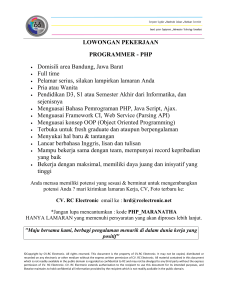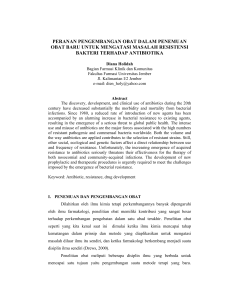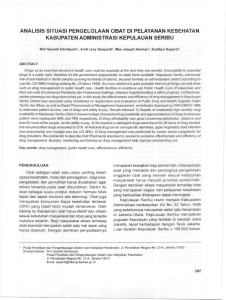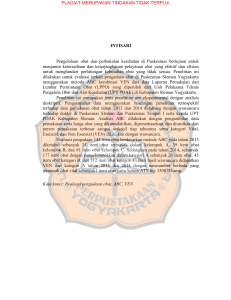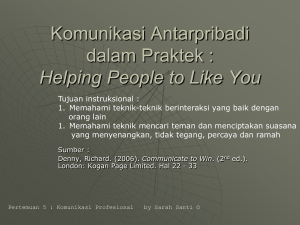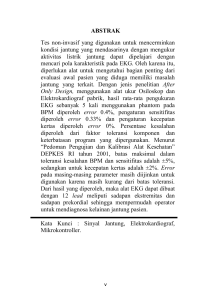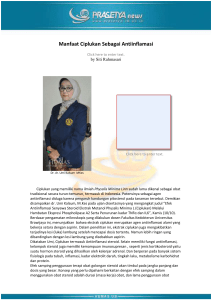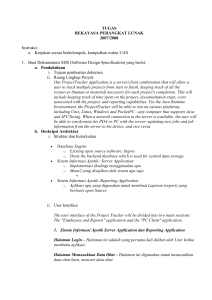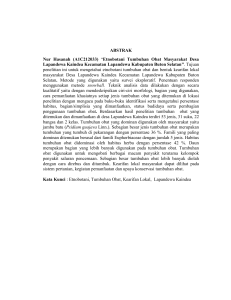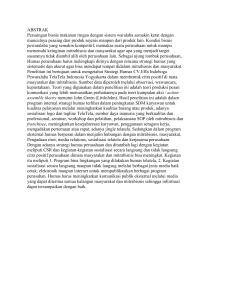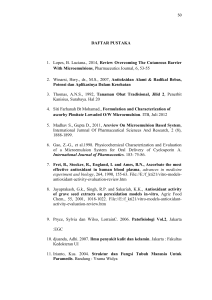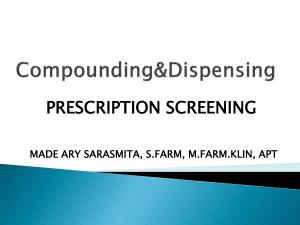Uploaded by
common.user5450
Sejarah Biofarmasetika: History & Principles of Biopharmaceutics
advertisement
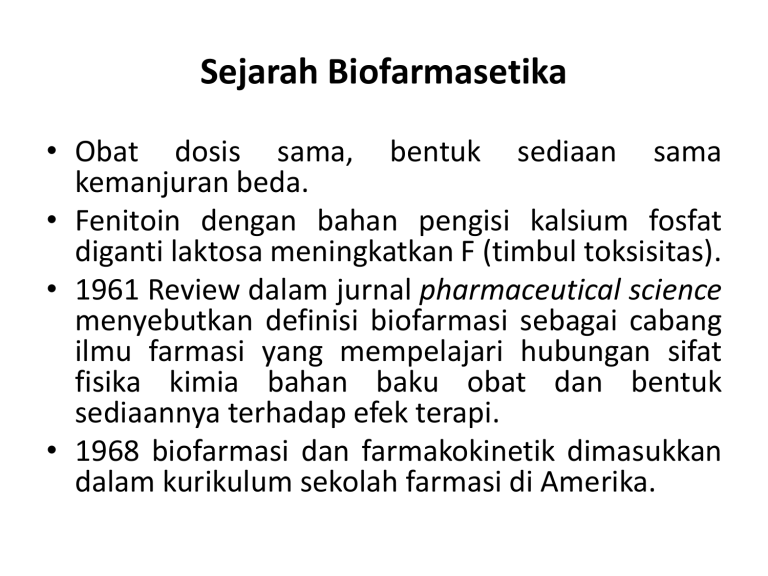
Sejarah Biofarmasetika • Obat dosis sama, bentuk sediaan sama kemanjuran beda. • Fenitoin dengan bahan pengisi kalsium fosfat diganti laktosa meningkatkan F (timbul toksisitas). • 1961 Review dalam jurnal pharmaceutical science menyebutkan definisi biofarmasi sebagai cabang ilmu farmasi yang mempelajari hubungan sifat fisika kimia bahan baku obat dan bentuk sediaannya terhadap efek terapi. • 1968 biofarmasi dan farmakokinetik dimasukkan dalam kurikulum sekolah farmasi di Amerika. What is biopharmaceutics ? • Bio – life • Pharmaceutics – general area of study concerned with the formulation, manufacture, stability and effectiveness of pharmaceutical dosage forms. Biopharmaceutics • Study of the factors influencing the bioavailability of a drug in man and animals and the use of this information to optimize pharmacological or therapeutic activity of drug products in clinical application. • The study of the relationship of the physicochemical properties and in vitro behavior of the drug and drug product on the delivery of the drug to the body under normal or pathologic conditions. • A scientist educated in the field of biopharmaceutics or biopharmaceutical sciences could have expertise in a number of interrelated specialty disciplines. – formulation, pharmacokinetics(PK), cell-based transport, drug delivery, physical pharmacy, chemistry, physiology, physics, statistics, engineering, mathematics, microbiology, enzymology, and cell biology. Physical Pharmacy • Study the physical–chemical properties of drugs and their influence on biological performance : – – – – – Solubility Hydrophilicity/lipophylicity Salts form & polymorphs Stability particle & powder properties Ionization & pKa Formulation • The goal of a formulation scientist is to manipulate the properties and environment of the API to optimize its delivery to the target tissue by a specific route of administration and to do so in a manner compatible with large-scale product manufacture. Pharmacokinetics • The other broad discipline in biopharmaceutics is PK, which is the study of the time course of ADME (Gibaldi and Perrier,1982;Rowland and Tozer,1989). Just as the physical-chemical and formulation principles are intimately linked with the pharmacokinetic profile, the PK profile is directly related to the pharmacologic activity of a drug. Drug & Drug Product • Potent chemical substances that must be fabricated into a drug product before use. • Generally, the drug is combined with other ingredients into a drug formulation. • The development of biopharmaceutic principles allowed for the rational design of drug products, which would enhance the delivery of active drug, and optimize the therapeutic efficacy of the drug in the patient. Dosage form vs Drug delivery dosage form is often used to refer to the physical appearance of drug like tablets, capsules, syrup, ointments, creams etc. drug delivery : is used to refer to the way of dosage from releases the drug and delivers it to the target organ, tissue, cell or celluler organelle. for example OROS system of nifedipin. • Biofarmasi : mempelajari pengaruh aspek fisika kimia obat dan bentuk sediaan terhadap efek terapetik. • efek terapi ditentukan oleh proses ADME oleh karena itu biofarmasetika sangat memperhatikan proses farmakokinetik tersebut. • tujuan biofarmasi dalam teknologi obat adalah (1) memaksimalkan efisiensi terapi bahan aktif obat dan meminimalkan efek • pelepasan dipengaruhi oleh bentuk sediaan, formulasi, cara pembuatan (farmasetik), ukuran partikel, polimorfi dsb (faktor fiskim obat). • pelepasan dapat dikontrol agar absorbsi terjadi lama. • obat setelah lepas diabsorbsi, tidak semua diabsorbsi ada yang terurai setelah lepas. • absorbsi dipengaruhi oleh kelarutan dalam air, stabilitas, permeabilitas dan first pass • distribusi dipengaruhi blood flow, ukuran molekul, polaritas dan ikatan dengan serum protein membentuk komplek yang akan mengurangi jumlah obat bebas yang akan berinteraksi dengan target site. • metabolisme mengubah parent compound menjadi metabolit, baik metabolit yang aktif maupun yang tidak aktif (mereduksi efek yang ditimbulkan). • senyawa obat dan metabolitnya dikeluarkan Drug Action • Result of an interaction between the drug substance and functionally important cell receptors or enzyme systems. • When drug molecules bind with a receptor, they can cause a reaction that: – stimulates (agonists) or – inhibits (antagonists) cellular functions. Concentration & Effect Dose Response Curve • It is difficult to measure the amount of a drug at the site of action (inside a tissue or an organ) and therefore to predict an effect based of dose-response curve. Concentration and Drug Effect • A better way is to relate the effect to the amount of drug in the body. • Its effect is to determine drug concentrations in the body’s fluids. • Blood is generally used because of its rapid equilibrium between the site of administration and the site of action. • Knowing a drug’s concentration in the blood can be directly related to its effect. Blood Concentration-Time Profiles Drug Product Performance Parameters: • Minimum effective concentration (MEC): The minimum concentration of drug needed at the receptors to produce the desired pharmacologic effect. • Minimum toxic concentration (MTC): The drug concentration needed to just produce a toxic effect. • Onset time: The time required for the drug to reach the MEC. • The time of peak plasma level: The time of maximum drug concentration in the plasma and is proportional to the rate of drug absorption. • The peak plasma level: The maximum drug concentration, usually related to the dose and the rate constants for absorption and elimination of the drug. • Area under the curve: It is related to the amount of drug absorbed systemically. • Biofarmasi dan farmakokinetik menjadi pertimbangan utama pengembangan produk baru. • produk harus diyakini kemanjurannya dengan diuji bioavailabilitasnya dan memiliki bioekivalensi dengan innovator. Factors Affecting Biopharmaceutics A. Physical state of the drug – The crystal or amorphous forms and/or the particle size of a powdered drug have been shown to affect the dissolution rate, and thus the rate of absorption, for a number of drugs. – By selective control of the physical parameters of a drug, biologic response may be optimized. B. Dosage form delivery system for the drug could be available or administered. Each of dosage unit is designed to contain a specified quantity of Scope of Biopharmaceutics • Encompasses all possible effects observed following the administration of the drug in the various dosage forms. • Encompasses all possible effects of various dosage forms on biological response • Encompasses all possible physiological factors which may affect the drug in various dosage forms. A primary concern in biopharmaceutics is the bioavailability of drugs. Bioavailability refers to the measurement of the rate and extent of active drug that reaches the systemic circulation. Drug Bioavailability Process Drug in the drug product Solid drug particles Drug in solution Drug in the body Factors Affecting Drug Bioavailability .1Type of the drug product .2Nature of excipients in the drug product .3Physico-chemical properties of the drug 4. Anatomy and physiology of GIT
